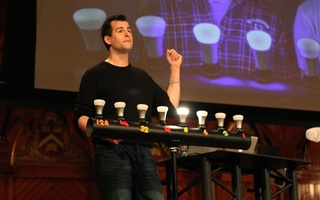"Is CS any more important a subject? Does it require that students adhere to its policies more strictly?" he asks, adding that there may be some legitimacy into looking in to expanding this methodology to other courses with problem sets.
The Magical Disk
Since CS50 assignments are submitted as disks, it is easy for TFs to plug each one into a similarity comparison program.
"The thing that makes [plagiarism detection] possible is not the genre of the work," he says. "It's the fact that work is submitted in electronic form."
There is no reason, he says, that this methodology cannot be extended to other courses at Harvard if there is interest.
The software can be adapted to any subject as long as work is submitted electronically, he says.
"You can have computer aids comparing English and philosophy papers," he says. "If some English professor wanted to use [the software], we'd give it to them, and it would be equally effective."
Read more in News
Gore, Bush Seal Nominations With Huge WinsRecommended Articles
-
Cut And Paste, Catch CheatersThe Internet has become the answer to cheaters’ prayers, diminishing any chance that professors might have to identify plagiarized source
-
Fighting Plagiarism, Schools Go High-TechWhat makes Kaavya Viswanathan ’08 unusual is not the fact that she plagiarized passages from another author’s work—it’s the fact
-
Pilot Program Takes Aim at PlagiarismInstructors in one sociology course will use anti-plagiarism software to catch copycats in their class, as part of a new
-
Professors Ask Computers to Catch CheatingProfessors are more widely employing algorithms, from decades-old codes to ones created by instructors, as an automated means to detect plagiarism in student assignments.
-
 Under CS50 Policy, Accused Students Likely Left in Dark
Under CS50 Policy, Accused Students Likely Left in Dark













